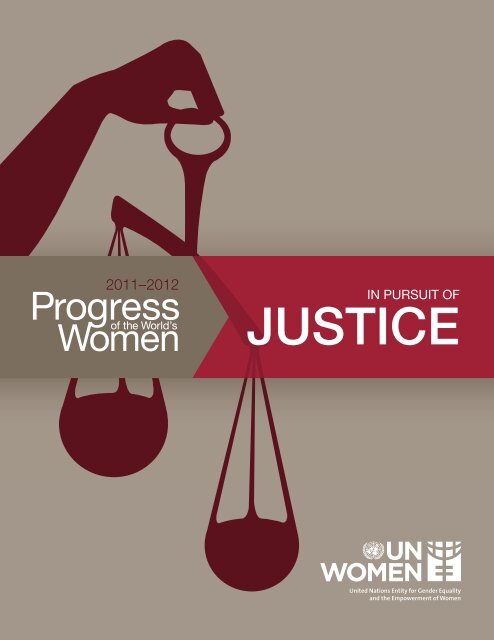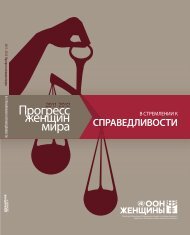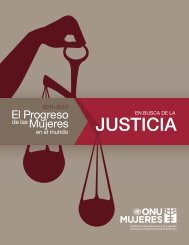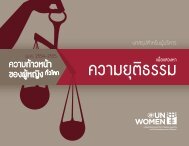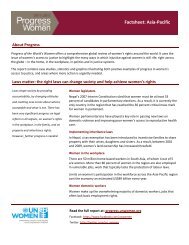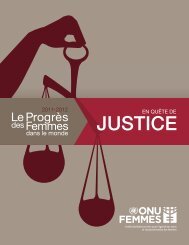JUSTICE JUSTICE - Progress of the World's Women
JUSTICE JUSTICE - Progress of the World's Women
JUSTICE JUSTICE - Progress of the World's Women
Create successful ePaper yourself
Turn your PDF publications into a flip-book with our unique Google optimized e-Paper software.
2011–2012<br />
IN PURSUIT OF<br />
<strong>JUSTICE</strong>
Balancing <strong>the</strong> Scales:<br />
Groundbreaking Legal Cases that have Changed <strong>Women</strong>’s Lives<br />
<strong>Women</strong> who refuse to stay silent in <strong>the</strong><br />
face <strong>of</strong> injustice, who persist in spite <strong>of</strong><br />
overwhelming obstacles to use all legal<br />
avenues available in pursuit <strong>of</strong> <strong>the</strong>ir cause,<br />
<strong>the</strong>se women have changed <strong>the</strong> world.<br />
Strategic litigation is <strong>the</strong> process <strong>of</strong> bringing a case to court with <strong>the</strong> goal <strong>of</strong><br />
creating broader legal and social change. Alongside political lobbying and<br />
mobilizing social movements, it is a tactic that advocates have used to challenge<br />
gender discrimination and raise awareness <strong>of</strong> women’s rights.<br />
Where it is successful, strategic litigation can have groundbreaking results. By<br />
identifying gaps or changing laws that violate constitutional or human rights<br />
principles, such cases can motivate government action to provide for citizens,<br />
guarantee <strong>the</strong> equal rights <strong>of</strong> minorities or stop discrimination. The greatest<br />
impact is achieved when cases are part <strong>of</strong> wider campaigns for social change that<br />
provoke public debate and discussion in <strong>the</strong> media, to help ensure that progressive<br />
decisions are embraced by society as a whole.<br />
The cases highlighted have increased women’s access to justice in countries all<br />
over <strong>the</strong> world. Some have advanced <strong>the</strong> legal understanding <strong>of</strong> women’s human<br />
rights under international law and confirmed that <strong>the</strong>y are enforceable at <strong>the</strong><br />
national level; some have enforced or clarified laws already on <strong>the</strong> books; some<br />
have challenged laws that should be repealed; and some have created new laws.<br />
All have led to positive changes in women’s lives.<br />
16 | <strong>Progress</strong> <strong>of</strong> <strong>the</strong> World’s <strong>Women</strong>
When a husband rapes<br />
his wife, it is a crime<br />
Meera Dhungana on behalf <strong>of</strong> FWLD v HMG<br />
In Nepal, married women subjected to rape by <strong>the</strong>ir husbands had no<br />
recourse to justice until 2002, when <strong>the</strong> Forum for <strong>Women</strong>, Law and<br />
Development (FWLD) brought a case to <strong>the</strong> Supreme Court. The case<br />
invalidated <strong>the</strong> provision <strong>of</strong> <strong>the</strong> criminal code that exempted husbands<br />
from being charged with <strong>the</strong> rape <strong>of</strong> <strong>the</strong>ir wives. 1<br />
In rejecting <strong>the</strong> Government’s argument that outlawing marital rape<br />
would <strong>of</strong>fend Hindu beliefs, <strong>the</strong> ruling also ended <strong>the</strong> conflict between<br />
<strong>the</strong> country’s Muluki Ain civil code, based on Hindu religious principles,<br />
and <strong>the</strong> 1990 Constitution, which pledges to end all forms <strong>of</strong> gender<br />
discrimination. The Court stated:<br />
‘Sexual intercourse in conjugal life is a normal course <strong>of</strong><br />
behaviour, which must be based on consent. No religion<br />
may ever take it [marital rape] as lawful because <strong>the</strong> aim<br />
<strong>of</strong> a good religion is not to hate or cause loss to anyone.’ 2<br />
The Court ordered Parliament to amend <strong>the</strong> rape law, but <strong>the</strong> penalty<br />
for marital rape was set at only six months’ imprisonment, significantly<br />
lower than for o<strong>the</strong>r types <strong>of</strong> sexual assault. FWLD went back to court,<br />
winning a decision that <strong>the</strong> difference in penalties was discriminatory<br />
and that <strong>the</strong> law must be amended. 3<br />
Cases such as <strong>the</strong>se reflect sweeping changes to <strong>the</strong> assumption that<br />
a wife implicitly consents to all sexual activity. By April 2011, at least<br />
52 States had explicitly outlawed marital rape in <strong>the</strong>ir criminal codes<br />
(see Annex 4).<br />
<strong>Women</strong> have <strong>the</strong> right to be<br />
free from sexual harassment<br />
in <strong>the</strong> workplace<br />
Vishaka v State <strong>of</strong> Rajasthan<br />
When Bhanwari Devi was gang-raped by local men while doing her job<br />
as a social worker in a village in Rajasthan, India she not only initiated<br />
criminal proceedings, but she also sought a broader remedy for o<strong>the</strong>r<br />
working women. Supported by five women’s organizations, including<br />
Vishaka, she took <strong>the</strong> case to <strong>the</strong> Indian Supreme Court, where in 1997<br />
she eventually won watershed recognition <strong>of</strong> sexual harassment in <strong>the</strong><br />
workplace, against which <strong>the</strong> Government had an obligation to provide<br />
legal protection.<br />
Undeterred by <strong>the</strong> absence <strong>of</strong> existing sexual harassment laws, <strong>the</strong><br />
Court’s decision recognized <strong>the</strong> right to gender equality and to a safe<br />
working environment, free from sexual harassment or abuse, based on<br />
<strong>the</strong> Constitution and India’s international obligations under CEDAW. 4 The<br />
Court used <strong>the</strong> case to produce <strong>the</strong> first enforceable civil law guidelines<br />
on <strong>the</strong> rights <strong>of</strong> working women to be free from violence and harassment<br />
in both public and private employment. This prompted <strong>the</strong> Government<br />
to introduce a long-awaited bill prohibiting sexual harassment in <strong>the</strong><br />
workplace in 2007. 5<br />
The case has also inspired o<strong>the</strong>r reformers in <strong>the</strong> region. In 2009, <strong>the</strong><br />
Supreme Court <strong>of</strong> Bangladesh, referring to <strong>the</strong> Vishaka case, recognized<br />
that <strong>the</strong> ‘harrowing tales <strong>of</strong> repression and sexual abuse <strong>of</strong> women in<br />
<strong>the</strong>ir workplaces’ were a result <strong>of</strong> <strong>the</strong> Government’s failure to enact a<br />
sexual harassment law. The detailed guidelines on protection against<br />
sexual harassment set out in <strong>the</strong> case now have <strong>the</strong> force <strong>of</strong> law in<br />
Bangladesh until <strong>the</strong> Government enacts <strong>the</strong> relevant legislation. 6<br />
Similarly, in Pakistan, advocates looked to <strong>the</strong> Vishaka guidelines in<br />
preparation for <strong>the</strong>ir successful push for legislation to protect women<br />
from harassment in <strong>the</strong> workplace. 7 Balancing <strong>the</strong> Scales | 17<br />
Salman Usmani<br />
Bhanwari Devi in her house in a village near Jaipur, India in 2007.
It is not enough to have laws in place, <strong>the</strong>y must be implemented<br />
Şahide Goekce (deceased) v Austria and<br />
Fatma Yildirim (deceased) v Austria<br />
Şahide Goekce and Fatma Yildirim were both murdered by <strong>the</strong>ir husbands<br />
following years <strong>of</strong> brutal abuse. Despite reporting <strong>the</strong> violence to <strong>the</strong><br />
police and obtaining protection orders, lack <strong>of</strong> coordination among law<br />
enforcement and judicial <strong>of</strong>ficials resulted in repeated failure to detain<br />
<strong>the</strong> <strong>of</strong>fenders and ensure <strong>the</strong> women’s safety. 8<br />
Two non-governmental organizations (NGOs) took <strong>the</strong> cases to <strong>the</strong><br />
CEDAW Committee under <strong>the</strong> Optional Protocol. The Committee’s<br />
decisions on <strong>the</strong> cases in 2007 were <strong>of</strong> global significance because<br />
<strong>the</strong>y made clear that <strong>the</strong> State’s obligation to protect women from<br />
domestic violence extends beyond passing laws. The Committee found<br />
that Austria had failed to act with ‘due diligence’, by not ensuring<br />
that <strong>the</strong> law was implemented properly. In <strong>the</strong> Goekce case <strong>the</strong><br />
Committee said:<br />
‘In order for <strong>the</strong> individual woman victim <strong>of</strong> domestic<br />
violence to enjoy <strong>the</strong> practical realization <strong>of</strong> <strong>the</strong> principle<br />
<strong>of</strong> equality <strong>of</strong> men and women and <strong>of</strong> her human rights<br />
and fundamental freedoms, <strong>the</strong> political will…must be<br />
supported by State actors, who adhere to <strong>the</strong> State party’s<br />
due diligence obligations.’ 9<br />
In response to <strong>the</strong> Committee’s recommendations and <strong>the</strong> media<br />
attention that surrounded <strong>the</strong> case, <strong>the</strong> Austrian Government introduced<br />
and accelerated legal reforms to protect women from violence, including<br />
an amendment to <strong>the</strong> Code <strong>of</strong> Criminal Procedure, new protection<br />
measures and <strong>the</strong> creation <strong>of</strong> specialized domestic violence prosecutors.<br />
In order to support <strong>the</strong>se reforms, <strong>the</strong> Government increased funding for<br />
implementation <strong>of</strong> <strong>the</strong> law by 60 percent in 2007. 10<br />
Maria da Penha Fernandes v Brazil<br />
As she slept at her home in<br />
May 1983, Maria da Penha<br />
Fernandes was shot by her<br />
husband. Having suffered years<br />
<strong>of</strong> debilitating abuse, <strong>the</strong> mo<strong>the</strong>r <strong>of</strong><br />
three children was left paralyzed<br />
from <strong>the</strong> waist down. Two<br />
weeks after her return from <strong>the</strong><br />
hospital, her husband attempted<br />
to electrocute her. The case<br />
languished in <strong>the</strong> criminal justice<br />
system for years and Maria’s<br />
husband remained free for nearly<br />
two decades. When he was finally<br />
sentenced in 2002, he served just<br />
two years in prison.<br />
In this landmark ruling, <strong>the</strong> Inter-American Court <strong>of</strong> Human Rights<br />
held <strong>the</strong> Government <strong>of</strong> Brazil responsible under international law for<br />
failing to take effective action to prosecute and convict perpetrators <strong>of</strong><br />
domestic violence. It stated that:<br />
‘Failure to prosecute and convict <strong>the</strong> perpetrator...is an<br />
indication that <strong>the</strong> Brazilian State condones <strong>the</strong> violence<br />
suffered by Maria da Penha and this failure by <strong>the</strong><br />
Brazilian courts to take action is exacerbating <strong>the</strong> direct<br />
consequences <strong>of</strong> <strong>the</strong> aggression by her ex-husband.’ 11<br />
The case contributed to <strong>the</strong> growing international consensus that States<br />
have a legal obligation to take positive steps, measured by <strong>the</strong> standard<br />
<strong>of</strong> ‘due diligence’, to uphold women’s human rights.<br />
Conselho Nacional de Justiça/CNJ<br />
Maria da Penha, March 2011, Brazil.<br />
In 2006, <strong>the</strong> Government <strong>of</strong> Brazil enacted domestic violence legislation,<br />
symbolically named <strong>the</strong> Maria da Penha Law on domestic and family<br />
violence, mandating preventative measures, special courts and tough<br />
sentences. 12 Maria da Penha continues to campaign for justice for<br />
survivors <strong>of</strong> domestic abuse and is outspoken about <strong>the</strong> need for<br />
thorough implementation <strong>of</strong> <strong>the</strong> law.<br />
18 | <strong>Progress</strong> <strong>of</strong> <strong>the</strong> World’s <strong>Women</strong>
Intersectional discrimination can<br />
be challenged<br />
Lovelace v Canada<br />
After getting a divorce, Sandra Lovelace, an Aboriginal Maliseet woman,<br />
wanted to return to live on her reservation. However, according to<br />
Canada’s Indian Act, she could no longer claim this right because she<br />
had lost her legal ‘Indian status’ when she married a non-Aboriginal<br />
man.<br />
In this groundbreaking 1981 decision, <strong>the</strong> United Nations Human<br />
Rights Committee decided that <strong>the</strong> Indian Act amounted to a violation<br />
<strong>of</strong> Canada’s human rights obligations. The Committee found that<br />
<strong>the</strong> restrictions in <strong>the</strong> Act were nei<strong>the</strong>r reasonable nor necessary to<br />
preserve Maliseet identity and in fact interfered with Sandra Lovelace’s<br />
right to enjoy her culture. 13<br />
The decision prompted international discussion about <strong>the</strong><br />
‘intersectional’ discrimination faced by groups such as indigenous<br />
women, who are discriminated against on <strong>the</strong> basis <strong>of</strong> <strong>the</strong>ir ethnicity,<br />
which is compounded by <strong>the</strong> discrimination that <strong>the</strong>y experience on <strong>the</strong><br />
basis <strong>of</strong> <strong>the</strong>ir gender. Sandra Lovelace used <strong>the</strong> Committee’s decision<br />
to campaign for <strong>the</strong> law to be changed and in 1985, <strong>the</strong> Government<br />
<strong>of</strong> Canada responded by amending <strong>the</strong> Indian Act to eliminate gender<br />
discrimination in determining ‘Indian status’. 14<br />
Inspired by <strong>the</strong> Lovelace case, advocates have continued to challenge<br />
laws that discriminate against Aboriginal women. Strategic litigation in<br />
Canada has continued over <strong>the</strong> right to ‘Indian status’ for children on <strong>the</strong><br />
basis <strong>of</strong> <strong>the</strong> gender <strong>of</strong> <strong>the</strong>ir grandparents. 15 Sandra Lovelace continues<br />
to campaign for Aboriginal women’s rights and in 2005 she became <strong>the</strong><br />
first Aboriginal woman elected to <strong>the</strong> Canadian Senate, representing<br />
New Brunswick.<br />
Customary inheritance laws<br />
must comply with guarantees<br />
<strong>of</strong> equality<br />
Bhe v Khayelitsha Magistrate<br />
When <strong>the</strong> fa<strong>the</strong>r <strong>of</strong> Nonkuleleko and Anelisa Bhe died, under <strong>the</strong> rule<br />
<strong>of</strong> primogeniture in African customary law and <strong>the</strong> Black Administration<br />
Act, <strong>the</strong>ir house became <strong>the</strong> property <strong>of</strong> <strong>the</strong> eldest male relative <strong>of</strong> <strong>the</strong><br />
fa<strong>the</strong>r, in this case <strong>the</strong>ir grandfa<strong>the</strong>r. The girls’ mo<strong>the</strong>r took action and<br />
in recognition <strong>of</strong> its wider significance, <strong>the</strong> South African Human Rights<br />
Commission and <strong>the</strong> <strong>Women</strong>’s Legal Centre Trust joined <strong>the</strong> case to seek<br />
relief on behalf <strong>of</strong> all women and children in a similar situation.<br />
The Constitutional Court <strong>of</strong> South Africa declared in 2004 that <strong>the</strong> rule<br />
<strong>of</strong> primogeniture and <strong>the</strong> customary law was unconstitutional, because<br />
it violated women’s rights. The Court said:<br />
‘The principle <strong>of</strong> primogeniture…violates <strong>the</strong> right <strong>of</strong><br />
women to human dignity…it implies that women are not<br />
fit or competent to own and administer property. Its effect<br />
is also to subject <strong>the</strong>se women to a status <strong>of</strong> perpetual<br />
minority, placing <strong>the</strong>m automatically under <strong>the</strong> control <strong>of</strong><br />
male heirs, simply by virtue <strong>of</strong> <strong>the</strong>ir sex and gender.’ 16<br />
The Court fur<strong>the</strong>r found that <strong>the</strong> Black Administration Act was<br />
anachronistic and racially discriminatory, since it solidified ‘<strong>of</strong>ficial’<br />
customary law and created a parallel system <strong>of</strong> succession for Black<br />
Africans. The Court implicitly recognized that <strong>the</strong> discrimination that<br />
resulted was ‘intersectional’, since ‘<strong>the</strong> impact <strong>of</strong> <strong>the</strong> provisions falls<br />
mainly on African women and children, regarded as arguably <strong>the</strong> most<br />
vulnerable groups in our society.’ 17<br />
Noel Chenier/ CP Photo/ New Brunswick Telegraph-Journal<br />
Campaigners are working to raise awareness <strong>of</strong> this decision to ensure<br />
that all widows and children, especially those in rural areas, can benefit<br />
from it.<br />
Newly elected Senator Sandra Lovelace in Canada’s Fredricton Legislature in 2005.<br />
Balancing <strong>the</strong> Scales | 19
Discriminatory citizenship laws are<br />
incompatible with constitutional<br />
guarantees <strong>of</strong> equality<br />
Unity Dow v Attorney General <strong>of</strong> <strong>the</strong> Republic <strong>of</strong> Botswana<br />
Despite being a citizen born and raised in Botswana, <strong>the</strong> law held that<br />
because Unity Dow had married a foreigner, <strong>the</strong>ir two children born in<br />
Botswana required residence permits to stay in <strong>the</strong> country, could only<br />
leave <strong>the</strong> country on <strong>the</strong>ir fa<strong>the</strong>r’s passport, would not be allowed to vote<br />
and would be denied <strong>the</strong> free university education available to citizens.<br />
In challenging <strong>the</strong> Government, Unity Dow declared:<br />
‘The time that women were treated as chattels or were<br />
<strong>the</strong>re to obey <strong>the</strong> whims and wishes <strong>of</strong> males is long<br />
past and it would be <strong>of</strong>fensive to modern thinking and<br />
<strong>the</strong> spirit <strong>of</strong> <strong>the</strong> Constitution to find that <strong>the</strong> Constitution<br />
was framed deliberately to permit discrimination on <strong>the</strong><br />
grounds <strong>of</strong> sex.’ 18<br />
The landmark 1992 case extended legal protection for women by<br />
successfully arguing that <strong>the</strong> guarantee <strong>of</strong> equality under <strong>the</strong> Constitution<br />
invalidated <strong>the</strong> section <strong>of</strong> Botswana’s Citizenship Act that prohibited<br />
women who married foreign men from passing <strong>the</strong> rights and privileges<br />
<strong>of</strong> citizenship on to <strong>the</strong>ir children. 19 Since this case, at least 19 countries<br />
in Africa have enacted reforms to provide for greater gender equality in<br />
<strong>the</strong>ir citizenship laws. 20<br />
<strong>Women</strong> have <strong>the</strong> right to an<br />
abortion in certain circumstances<br />
Judgment <strong>of</strong> <strong>the</strong> Constitutional Court <strong>of</strong> Colombia<br />
In 2006, <strong>Women</strong>’s Link Worldwide launched a strategic litigation case<br />
on behalf <strong>of</strong> Martha Solay, who was two months pregnant when she<br />
was diagnosed with cancer. Colombia’s laws prohibited doctors from<br />
performing an abortion to enable her to receive life-saving chemo<strong>the</strong>rapy.<br />
The lawyers argued before <strong>the</strong> Constitutional Court that consistency<br />
between <strong>the</strong> international human rights treaties that Colombia had<br />
ratified, including CEDAW, and national law was compulsory, not optional.<br />
In overturning one <strong>of</strong> <strong>the</strong> world’s most restrictive abortion laws, <strong>the</strong> Court<br />
held that <strong>the</strong> criminal prohibition <strong>of</strong> abortion in all circumstances violates<br />
women’s fundamental rights and it also affirmed that <strong>the</strong> procedure<br />
must be accessible in certain cases. The Court stated:<br />
‘Sexual and reproductive rights…emerge from <strong>the</strong><br />
recognition that…gender equality…and <strong>the</strong> emancipation<br />
<strong>of</strong> women and girls are essential to society. Protecting<br />
sexual and reproductive rights is a direct path to promoting<br />
<strong>the</strong> dignity <strong>of</strong> all human beings and a step forward in<br />
humanity’s advancement towards social justice.’ 21<br />
In response to <strong>the</strong> decision, <strong>the</strong> Government amended <strong>the</strong> penal code,<br />
developed clear rules regarding <strong>the</strong> provision <strong>of</strong> abortion services,<br />
issued technical guidelines based on <strong>the</strong> recommendations <strong>of</strong> <strong>the</strong> World<br />
Health Organization and made abortion available through <strong>the</strong> public<br />
health system. 22<br />
Recently however, political support for <strong>the</strong> implementation <strong>of</strong> <strong>the</strong>se<br />
laws has been questioned. In 2010, <strong>the</strong> United Nations Human Rights<br />
Committee expressed concern that ‘health-service providers refuse<br />
to perform legal abortions and that <strong>the</strong> Procurator-General does not<br />
support enforcement <strong>of</strong> <strong>the</strong> relevant Constitutional Court ruling’. 23 The<br />
campaign for full implementation <strong>of</strong> <strong>the</strong> Court’s ruling continues.<br />
Rosey Boehm Photography<br />
Unity Dow, speaking at <strong>the</strong> 2nd UniSA Nelson Mandela Lecture in 2009.<br />
20 | <strong>Progress</strong> <strong>of</strong> <strong>the</strong> World’s <strong>Women</strong>
Sexual violence is a tactic <strong>of</strong> war<br />
and a war crime<br />
Prosecutor v Tadić; Prosecutor v Furundžija; Prosecutor v<br />
Kunarac et al.; Prosecutor v Akayesu; Prosecutor v Delalic; and<br />
Prosecutor v Krstic<br />
Marco Ugarte/AP/Wide World<br />
Although it has long been possible to prosecute rape in war under <strong>the</strong><br />
general prohibition <strong>of</strong> ‘inhumane acts’ in <strong>the</strong> Geneva Conventions, <strong>the</strong><br />
conflict in <strong>the</strong> former Yugoslavia galvanized <strong>the</strong> international community<br />
to develop specific international law on sexual violence against women<br />
in armed conflict. 24<br />
The Statutes <strong>of</strong> <strong>the</strong> International Criminal Tribunal for <strong>the</strong> former<br />
Yugoslavia and <strong>the</strong> International Criminal Tribunal for Rwanda included<br />
rape as a crime against humanity. The case law expanded <strong>the</strong> scope<br />
fur<strong>the</strong>r, finding that rape and o<strong>the</strong>r gender-based crimes are tactics <strong>of</strong><br />
war that can amount to genocide and torture and as such are regarded<br />
as significant violations <strong>of</strong> international criminal law.<br />
The Akayesu case at <strong>the</strong> International Criminal Tribunal for Rwanda<br />
produced <strong>the</strong> first convictions on charges <strong>of</strong> rape and sexual violence<br />
at <strong>the</strong> Tribunals, confirming that rape can constitute an instrument <strong>of</strong><br />
genocide and is a crime against humanity. 25 The indictment did not<br />
initially include charges <strong>of</strong> sexual violence, but after a witness on <strong>the</strong><br />
stand spontaneously testified about <strong>the</strong> gang rape <strong>of</strong> her six-yearold<br />
daughter, members <strong>of</strong> <strong>the</strong> bench questioned <strong>the</strong> witnesses and<br />
encouraged prosecutors to amend <strong>the</strong> indictment to include charges<br />
<strong>of</strong> rape. 26<br />
Perhaps <strong>the</strong> most significant legacy <strong>of</strong> <strong>the</strong>se cases was <strong>the</strong>ir influence<br />
on <strong>the</strong> codification <strong>of</strong> sexual violence in <strong>the</strong> Rome Statute, which<br />
established <strong>the</strong> International Criminal Court in 2002, <strong>the</strong> first such court<br />
with <strong>the</strong> authority to punish crimes in armed conflicts. The Tribunals’<br />
work also brought about wider international understanding <strong>of</strong> sexual<br />
and gender-based violence in war. The landmark Security Council<br />
resolution 1820 has since confirmed that sexual violence can amount<br />
to a war crime, a crime against humanity and an act <strong>of</strong> genocide.<br />
The mo<strong>the</strong>rs <strong>of</strong> murdered young women in Ciudad Juárez, Mexico in 2004.<br />
Reparations for violence against<br />
women must be ‘transformative’<br />
Gonzalez and o<strong>the</strong>rs (‘Cotton Field’) v Mexico<br />
Hundreds <strong>of</strong> women, mostly young and poor, have been murdered<br />
in Ciudad Juárez in Mexico over <strong>the</strong> past two decades. Many <strong>of</strong> <strong>the</strong><br />
women were abducted and subjected to sexual violence and torture<br />
before being killed. Their bodies have later been found hidden in rubble<br />
or abandoned in deserted areas near <strong>the</strong> city. In November 2001, eight<br />
bodies were discovered in a cotton field.<br />
In 2009, <strong>the</strong> ‘Cotton Field’ case at <strong>the</strong> Inter-American Court <strong>of</strong> Human<br />
Rights, established that violence against women in Ciudad Juárez was<br />
part <strong>of</strong> a pattern <strong>of</strong> systematic violence based on gender, age and social<br />
class. The Court stated:<br />
‘<strong>the</strong>se crimes…have been influenced…by a culture<br />
<strong>of</strong> gender-based discrimination which…has had an<br />
impact on both <strong>the</strong> motives and <strong>the</strong> method <strong>of</strong> <strong>the</strong><br />
crimes, as well as on <strong>the</strong> response <strong>of</strong> <strong>the</strong> authorities…<br />
<strong>the</strong> indifferent attitudes that have been documented in<br />
relation to <strong>the</strong> investigation <strong>of</strong> <strong>the</strong>se crimes…appear to<br />
have permitted <strong>the</strong> perpetuation <strong>of</strong> <strong>the</strong> violence against<br />
women in Ciudad Juárez.’ 27<br />
The enduring significance <strong>of</strong> this case may lie in its approach to<br />
reparations. As well as providing monetary compensation for <strong>the</strong><br />
families, <strong>the</strong> Government <strong>of</strong> Mexico was called upon to provide symbolic<br />
redress and guarantees <strong>of</strong> non-repetition, including a commitment to<br />
investigate <strong>the</strong> murders and implement gender training for <strong>the</strong> police.<br />
The Court declared that <strong>the</strong> reparations should be ‘oriented to identify<br />
and eliminate <strong>the</strong> structural factors <strong>of</strong> discrimination’ and in doing so<br />
should aim at transforming <strong>the</strong> underlying gender inequalities that gave<br />
rise to <strong>the</strong> violence. 28 Balancing <strong>the</strong> Scales | 21


